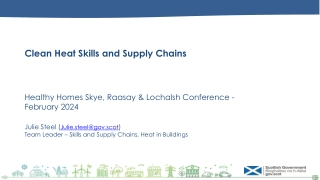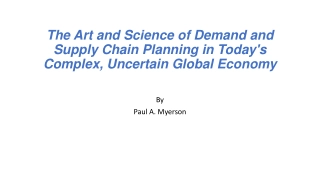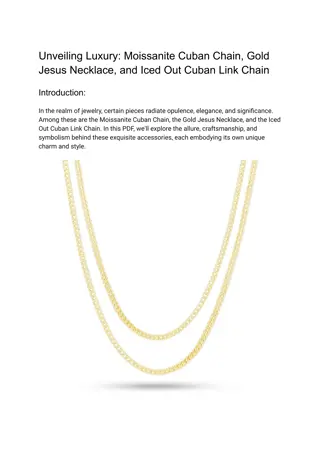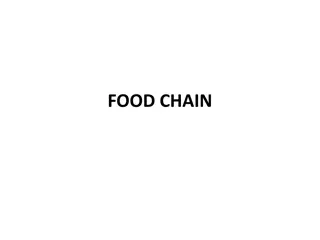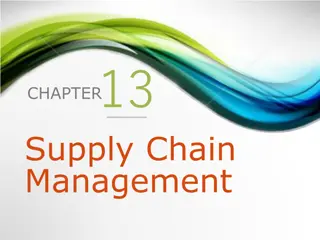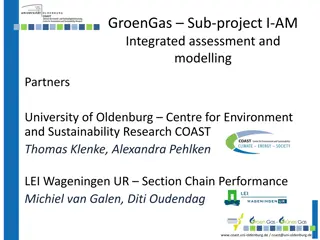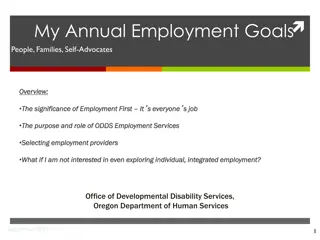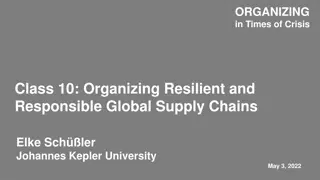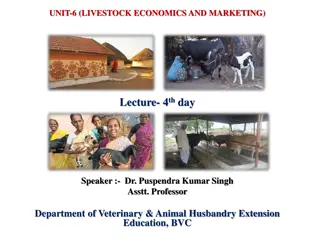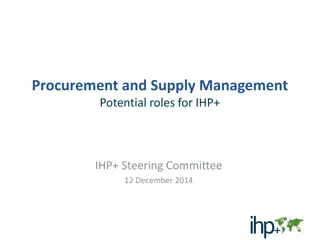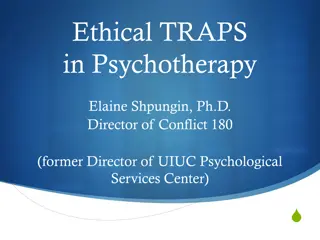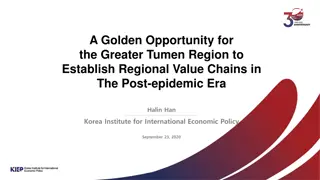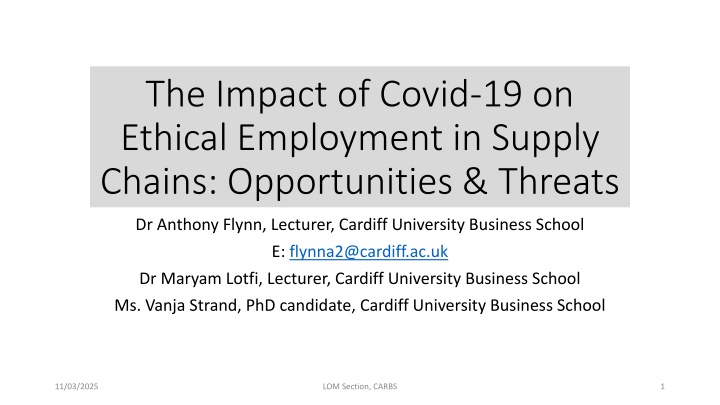
Impact of Covid-19 on Ethical Employment in Supply Chains: Opportunities & Threats
Maintaining employment standards in supply chains amid the Covid-19 pandemic poses challenges and opportunities. This presentation discusses five threats and opportunities arising from the pandemic and provides insights for businesses facing future disruptive events.
Download Presentation

Please find below an Image/Link to download the presentation.
The content on the website is provided AS IS for your information and personal use only. It may not be sold, licensed, or shared on other websites without obtaining consent from the author. If you encounter any issues during the download, it is possible that the publisher has removed the file from their server.
You are allowed to download the files provided on this website for personal or commercial use, subject to the condition that they are used lawfully. All files are the property of their respective owners.
The content on the website is provided AS IS for your information and personal use only. It may not be sold, licensed, or shared on other websites without obtaining consent from the author.
E N D
Presentation Transcript
The Impact of Covid-19 on Ethical Employment in Supply Chains: Opportunities & Threats Dr Anthony Flynn, Lecturer, Cardiff University Business School E: flynna2@cardiff.ac.uk Dr Maryam Lotfi, Lecturer, Cardiff University Business School Ms. Vanja Strand, PhD candidate, Cardiff University Business School 11/03/2025 LOM Section, CARBS 1
Introduction Introduction Maintaining employment standards in supply chains forms part of ethics and sustainability in business The Covid-19 pandemic has caused, and continues to cause, major disruption to supply chains and their workforces Covid-related disruption presents both opportunities and threats to employment standards in supply chains This presentation provides an overview of five opportunities and threats resulting from Covid-19 It also suggests what business can expect from future climatic, financial, technological and geo-political disruptive events 11/03/2025 LOM Section, CARBS 2
Method Method Twin-track approach to investigating the effect of Covid-19 on ethical employment in supply chains 1. Desk review of academic and practitioner literature on the topic 2. Discussions with industry stakeholders to elicit their experiences and opinions 11/03/2025 LOM Section, CARBS 3
Five threats threats to employment standards 1. Surge in demand 2. Collapse in demand 3. Crisis management mode 4. Restricted access to suppliers 5. Endangerment of migrant workers 11/03/2025 LOM Section, CARBS 4
1. Surge in demand Surge in demand for a product can undermine labour standards in supply chains EXAMPLE Covid-19 caused a surge in demand for personal protective equipment (PPE) a product line with high risk of modern slavery (Feinmann, 2020) Surges in demand New suppliers onboarded by public and private sector organisations without undergoing due diligence Restrictions rescinded on importing PPE from high-risk countries and/or firms with poor track records Existing PPE suppliers sub-contracted work to cottage industry where there is no oversight or scrutiny New workers hired in PPE manufacturing without undergoing right to work checks 11/03/2025 LOM Section, CARBS 5
2. Collapse in demand Collapse in demand can lead to temporary cessation of supplier operations and displacement of workers EXAMPLE Pandemic lockdown restrictions led to clothing retailers invoking force majeure and cancelling orders with garment suppliers Collapse in demand Retailers cancelled orders, delayed payments or requested discounts - approx. $12.3 bn in orders cancelled between April-June 2020 (Business & Human Rights Resource Centre, 2020) Workers laid off at short notice and without compensation Some retailers e.g., H&M, Primark established wage funds to cover the cost of labour for cancelled contracts, but others chose not to take this action (Clean Clothes Campaign, 2020) 11/03/2025 LOM Section, CARBS 6
3. Crisis management mode Covid-19 sent firms into crisis management mode, with ethical sourcing becoming less of a priority EXAMPLE UK supermarkets had to get existing suppliers to ramp up production levels at short notice, simplify their product mix, and identify new supply sources Crisis management mode Overriding priority for buyers is to secure supply lines and ensure continuation of operations Organisational human and financial resources re-directed away from ethical risk management and towards identifying new suppliers (in cases of demand surge) or conserving cash (in cases of demand collapse) Initiatives to train suppliers on ethical employment practices shelved and progress on combating modern slavery set back (Cole and Shirgholami, 2021) Temporary relaxation of government rules on modern slavery reporting 11/03/2025 LOM Section, CARBS 7
4. Restricted access to suppliers Covid-19 lockdown restrictions impaired the ability of firms to access suppliers, detect labour rights abuses and implement remediation EXAMPLE Travel restrictions and social distancing requirements made it difficult for retailers to inspect supplier premises in person Restricted access to suppliers Cancellation of onsite ethical audits e.g., M&S (2021) increased the risk that labour rights abuses and health & safety problems went undetected Cancellation of in-person inductions for new suppliers e.g., Next Plc (2021) hinders relationship building between buyers and suppliers Some firms temporarily went online for audits or instituted self-assessment questionnaires, but this approach is less effective in upholding ethical employment standards 11/03/2025 LOM Section, CARBS 8
5. Endangerment of migrant workers Covid-19 exposed the precarious status of migrant workers and exacerbated pre-existing health & safety issues in their workplaces EXAMPLE Garment suppliers in Leicester were found to be breaching Covid-19 regulations by not implementing social distancing measures for their mainly migrant workforces (www.FT.co.uk,2021) Endangerment of migrant workers UK garment factories remained open. Some employees were forced to work throughout the lockdown for less than minimum wage (Davies, 2020) Work continued under unsafe conditions (Inman, 2020) e.g., A textile factory worker reported that they were working with no gloves, no masks, no social distancing and that up to 40 workers would touch a single garment as it went around (Sanders, 2020) Cramped living and working conditions for migrants led to spread of virus (Koh, 2020) 11/03/2025 LOM Section, CARBS 9
Five opportunities opportunities for raising employment standards 1. Stakeholder collaboration 2. Supply chain mapping 3. Labour shortages 4. New regulations 5. Near-shoring 11/03/2025 LOM Section, CARBS 10
1. Stakeholder collaboration Covid-19 has acted as a catalyst for collaboration between industry stakeholders on economic, social and employment matters EXAMPLE Food Farm Help is a multi-stakeholder initiative established to help firms in the food industry manage operations during Covid-19 (www.foodfarmhelp.com) Stakeholder collaborations Increased frequency of interactions between government and industry actors in sectors like food production e.g., DEFRA and food producer associations New multi-stakeholder collaborations established e.g., Food Farm Help, Platform of Cities of the Global South (Cities Alliance, 2021) Buying firms started to work closely with key suppliers and support them during the pandemic e.g., M&S enabled smaller food suppliers to access immediate payment (M&S, 2020) 11/03/2025 LOM Section, CARBS 11
2. Supply chain mapping Covid-19 emphasized the importance of firms mapping their supply chains, knowing their suppliers at all tiers and promoting transparency EXAMPLE Majority of US firms were unsure if their suppliers were impacted by lockdown restrictions in Wuhan, China in first wave of pandemic (Choi et al. 2020) Supply chain mapping Supply chain mapping is central to risk management. Many firms were exposed by supplier closures and interruptions to the logistics network Firms with mapped supply chains were prepared to deal with pandemic disruptions. They had advanced knowledge of what suppliers, products, components and services were at risk of disruption. This gave them a first mover advantage in search for supply alternatives (Choi et al. 2020) Lockdown has given firms the time and incentive to map their supply chains and re- assess their supply risks (Christ and Burritt 2021) 11/03/2025 LOM Section, CARBS 12
3. Labour shortages Labour shortages resulting from Covid-19 (and Brexit) has increased worker bargaining power EXAMPLE Fewer seasonal workers were able to enter the UK and work on farms in the first wave of the pandemic, leading to a shortage of experienced fruit pickers Labour shortages In a tight labour market, employers improve their terms and conditions to attract new employees and/or retain existing employees e.g., Amazon Fulfilment Centres in the UK are offering a 1000 signing on bonus for new recruits (www.bbc.co.uk, 2021) Appreciation of the criticality of many unskilled worker roles to supply chains and the wider economy e.g., home care workers, logistics personnel, farm workers, etc. Incentives for employers to invest in their workforce through training and development 11/03/2025 LOM Section, CARBS 13
4. New regulations Covid-19 exposed inequalities across society and drew attention to areas where employment conditions could be improved EXAMPLE No legal right to paid sick leave in meat processing plants led to some infected workers showing up for work during pandemic Regulations Attempts to improve employment and health & safety standards in low-paid sectors e.g., a new Code of Practice for Meat Sector in Ireland EU plans to introduce requirement on firms to carry out due diligence on suppliers human rights and environmental protection standards (National Law Review, 2021) UK government updating and strengthening UK Modern Slavery Act as it relates to corporate responsibility for ethical supply chain management 11/03/2025 LOM Section, CARBS 14
5. Near-shoring Covid-19 is causing firms to re-assess their supply chain configuration and explore domestic or regional sources of supply EXAMPLE US medical technology firms are sourcing materials close to home post-Covid to avoid supply chain disruption and to take advantage of a collaborative feedback loop (Medical Product Outsourcing, 2021) Near-shoring Shift production away from countries with poor employment rights standards to countries where employment rights are enshrined in law and where risks of modern slavery are lower Greater oversight and control over supply chains situated near the home market Emphasis on increasing productivity of workers in supply chains near the home market and not relying on low-cost labour (Van Barneveld et al. 2020) 11/03/2025 LOM Section, CARBS 15
Five recommendations recommendations for firms post-Covid 1. Scenario planning 2. Technology usage 3. Supply chain awareness 4. Stakeholder engagement 5. Re-thinking business models 11/03/2025 LOM Section, CARBS 16
1. Scenario planning Firms should devise a contingency plan for managing supply chain disruptions without compromising employment standards ( war gaming ) Revisit force majeures in supply chain contracts for dealing with suppliers in the event of demand collapses e.g., payment for cancelled orders Revisit force majeures in supply chain contracts for dealing with suppliers in the event of demand surges e.g., flexible lead times Stress test ability to identify and onboard suppliers at short notice when demand surges Identify options for near shoring some of the supply chain and assess impacts on economic, social and environmental performance 11/03/2025 LOM Section, CARBS 17
2. Technology usage Firms should consider how technology can assist them in maintaining ethical employment standards Video conferencing tools can supplement physical inspection of supplier premises e.g., virtual follow-ups after undertaking onsite ethical audit Video conferencing tools can be used to frequently and easily engage with suppliers and ensure channels of communication remain open Online and text tools can be used by workers to flag labour rights issues Digitalization of business can create new value-adding roles in the supply chain, although training and investment in workers will be required as part of this digital transition 11/03/2025 LOM Section, CARBS 18
3. Supply chain awareness Firms should develop better awareness of their supply chains as part of safeguarding employment standards Invest resources to develop supply chain awareness Map supply chains in terms of sector, product and geographic risks for labour rights abuses and modern slavery Profile workers in the supply chain and identifying groups at risk of exploitation e.g., migrant workers have been worst affected by Covid-19; women in the workforce have been disproportionately impacted by Covid-19 Disclose information on suppliers below Tier 1 in the interests of transparent supply chain management 11/03/2025 LOM Section, CARBS 19
4. Stakeholder engagement Firms should engage with government, industry and civic society stakeholders to drive improvements in employment standards Recognise that combating problems like modern slavery in supply chains requires co-operation between multiple stakeholders Help regulators and professional bodies to develop responsible purchasing practices and means of policing suppliers and supply chains Co-operate with industry peers over commodity certification, supplier auditing and the creation of industry codes of conduct Avail of the expertise and experience of consultants, auditors and trainers in the ethical supply chain management field 11/03/2025 LOM Section, CARBS 20
5. Re-thinking business models Firms should re-think current business models that are based on cost minimisation at the expense of labour standards in supply chains (Banerjee, 2020; Crane et al. 2021) Pay suppliers fair rates to make it less likely that employment standards will be compromised Move away from hiring models that minimise pay and protections for self- contractors and over-rely on migrant labour Source materials and products with ethical and environmental certification e.g., Fairtrade coffee, Forestry Stewardship Council (FSC) cardboard Educate consumers on the human costs of fast fashion and other cheap, disposable products 11/03/2025 LOM Section, CARBS 21
References 1/4 Banerjee, B (2020). Modern Slavery Is an Enabling Condition of Global Neoliberal Capitalism: Commentary on Modern Slavery in Business. Business & Society. 60, 415-419. www.bbc.co.uk (2021). Amazon offers 1000 joining bonus for new UK staff. Available at https://www.bbc.com/news/business-58321728 Business & Human Rights Resource Centre (2020). Major fashion brands refused to pay for $16 bn in goods during Covid-19, leaving overseas suppliers unable to pay garment workers. Available at https://www.business-humanrights.org/en/latest-news/major-us-european-fashion-brands-refused-to-pay- for-16bn-of-goods-during-covid-19-leaving-overseas-suppliers-unable-to-pay-garment-workers/ Choi, T (2020). Corona virus is a wake-up call for supply chain management. Harvard Business Review. Available at https://hbr.org/2020/03/coronavirus-is-a-wake-up-call-for-supply-chain-management Christ, K. Burritt, R (2021). Accounting for modern slavery risk in the time of Covid-19: challenges and opportunities. Accounting, Auditing & Accountability Journal. 34,6. Available at https://www.emerald.com/insight/content/doi/10.1108/AAAJ-08-2020-4726/full/html Cities Alliance (2021). Available at https://www.citiesalliance.org/newsroom/events/enhancing-role-multi- stakeholder-collaborations-covid-19-mitigation 11/03/2025 LOM Section, CARBS 22
References 2/4 Clean Clothes Campaign (2020). Big brands have mistreated their workers throughout the Covid crisis. Available at https://cleanclothes.org/blog/big-brands-have-mistreated-their-workers-throughout-the-covid- 19-crisis Cole, R and Shirgholami, Z (2021). The outlook for modern slavery in the apparel sector in a post-lockdown economy. Supply Chain Management: An International Journal. Crane, A., LeBaron, G., Phung, K., Behbahani, L. and Allain, J (2021). Confronting the business models of modern slavery. Journal of Management Inquiry. In press. Davies, R. (2020). Boohoo co-founder Jalal Kamani linked to Leicester garment factory. The Guardian. Feinmann, F (2020). The scandal of modern slavery in the trade of masks and gloves. British Medical Journal, 369, Available at https://www.bmj.com/content/369/bmj.m1676 Financial Times (2021). Boohoo audits highlight Covid concerns at factories. Available at https://www.ft.com/content/f1e02db4-7471-4b15-bec0-b3c3a170d15d 11/03/2025 LOM Section, CARBS 23
References 3/4 Grant, H. (2020), No food, water, masks or gloves : migrant farm workers in Spain at crisis point, The Guardian. Available at https://www.theguardian.com/global-development/2020/may/01/no-food-water-masks- or-gloves-migrant-farm-workers-in-spain-at-crisis-point Koh, D (2020). Migrant workers and Covid-19. Occupational & Environmental Medicine, 77, 634-36. Available at https://oem.bmj.com/content/77/9/634.info M&S (2020). M&S response to Covid-19: workers in supply chains. Available at https://corporate.marksandspencer.com/documents/plan-a/m-and-s-response-to-covid19-workers-in- supply-chains Medical Product Outsourcing (2021). Pandemic has accelerated nearshoring medtech materials. Available at https://www.mpo-mag.com/contents/view_online-exclusives/2021-08-06/pandemic-has-accelerated- nearshoring-medtech-materials/ National Law Review (2021). EU mandatory environmental and human rights due diligence law what you need to know. Available at https://www.natlawreview.com/article/eu-mandatory-environmental-and- human-rights-due-diligence-law-what-you-need-to-know 11/03/2025 LOM Section, CARBS 24
References 4/4 Next Plc (2021). Modern slavery transparency statement 2021. Available at https://www.nextplc.co.uk/~/media/Files/N/Next-PLC-V2/documents/corporate-responsibility/modern- slavery-transparency-2021.pdf Sanders, L. (2020). Leicester lockdown unveils the truth about its fast fashion industry Euronews. Available at https://www.euronews.com/2020/07/12/leicester-lockdown-unveils-the-truth-about-its-fast-fashion- industry Sedex (2021). Ten priorities for sourcing more responsibly during Covid-19 lockdown. Available at https://www.sedex.com/10-priorities-for-sourcing-more-responsibly-during-covid-19-recovery/ Van Barneveld, K. Quinlan, M. Kriesler, P. et al. (2020). The Covid-19 pandemic: lessons on building more equal and sustainable societies. The Economic & Labour Relations Review. 31, 2, 133-57. Available at https://journals.sagepub.com/doi/full/10.1177/1035304620927107 Voss, H (2020). Implications of the COVID-19 Pandemic for Human Rights and Modern Slavery Vulnerabilities in Global Value Chains. Transnational Corporations Journal. 27, 2. Available at https://papers.ssrn.com/sol3/papers.cfm?abstract_id=3692319 11/03/2025 LOM Section, CARBS 25

